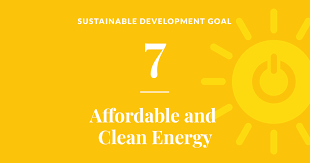The Importance of Sustainable Development Goal 7: Affordable and Clean Energy
Sustainable Development Goal 7 (SDG 7) is a crucial component of the United Nations’ 2030 Agenda for Sustainable Development. This goal focuses on ensuring access to affordable, reliable, sustainable, and modern energy for all. With the world facing environmental challenges and the urgent need to transition to cleaner energy sources, SDG 7 plays a vital role in shaping a more sustainable future.
Key Objectives of SDG 7:
- Promote universal access to affordable, reliable, and modern energy services
- Increase the share of renewable energy in the global energy mix
- Improve energy efficiency in all sectors
- Enhance international cooperation to facilitate access to clean energy research and technology
The Impact of Achieving SDG 7:
By achieving SDG 7, countries can reduce their reliance on fossil fuels, mitigate climate change impacts, improve air quality, and promote sustainable economic growth. Access to clean and affordable energy can also empower communities by enhancing productivity, creating job opportunities, and improving living standards.
Challenges Ahead:
Despite the importance of SDG 7, there are challenges that hinder its progress. These include inadequate infrastructure for clean energy production, lack of investment in renewable technologies, and limited access to electricity in remote areas. Addressing these challenges requires strong political will, innovative solutions, and collaboration among governments, businesses, and civil society.
Our Role in Achieving SDG 7:
As individuals, we can contribute to achieving SDG 7 by adopting energy-efficient practices in our daily lives, supporting renewable energy initiatives, advocating for policies that promote clean energy sources, and raising awareness about the importance of sustainable energy consumption. Together, we can work towards a greener and more sustainable future for generations to come.
Empowering a Brighter Future: Understanding and Achieving Sustainable Development Goal 7 (SDG 7)
- What is Sustainable Development Goal 7 (SDG 7)?
- Why is SDG 7 important?
- What are the key targets of SDG 7?
- How can individuals contribute to achieving SDG 7?
- What are the challenges in implementing SDG 7?
- How does achieving SDG 7 benefit society and the environment?
What is Sustainable Development Goal 7 (SDG 7)?
Sustainable Development Goal 7 (SDG 7) is a vital component of the United Nations’ 2030 Agenda for Sustainable Development. It aims to ensure universal access to affordable, reliable, sustainable, and modern energy for all. SDG 7 focuses on promoting renewable energy sources, improving energy efficiency, and enhancing international cooperation in clean energy technology. By addressing the need for clean and affordable energy, SDG 7 plays a crucial role in mitigating climate change, fostering economic growth, and improving the quality of life for people around the world.
Why is SDG 7 important?
Sustainable Development Goal 7 (SDG 7) holds significant importance due to its fundamental role in ensuring universal access to affordable, reliable, and clean energy. Access to sustainable energy is essential for powering economic development, improving living standards, and mitigating the impacts of climate change. By advancing SDG 7, we can reduce reliance on fossil fuels, promote renewable energy sources, enhance energy efficiency, and foster a more sustainable future for all. Achieving SDG 7 not only addresses energy poverty but also contributes to environmental protection, economic growth, and social equity on a global scale.
What are the key targets of SDG 7?
One frequently asked question regarding Sustainable Development Goal 7 (SDG 7) is about its key targets. The targets of SDG 7 include promoting universal access to affordable, reliable, and modern energy services, increasing the share of renewable energy in the global energy mix, improving energy efficiency across all sectors, and enhancing international cooperation to facilitate access to clean energy research and technology. These targets are essential for advancing sustainable development, combating climate change, and ensuring a more sustainable and equitable energy future for all.
How can individuals contribute to achieving SDG 7?
One common question regarding Sustainable Development Goal 7 is: “How can individuals contribute to achieving SDG 7?” Individuals play a crucial role in advancing SDG 7 by adopting sustainable energy practices in their daily lives. This includes reducing energy consumption, using energy-efficient appliances, supporting renewable energy sources, and advocating for policies that promote clean energy. By making conscious choices to conserve energy and raise awareness about the importance of sustainable energy consumption, individuals can significantly contribute to the global effort of achieving universal access to affordable and clean energy for all.
What are the challenges in implementing SDG 7?
Implementing Sustainable Development Goal 7 (SDG 7) poses several challenges that need to be addressed for its successful realization. One significant challenge is the lack of adequate infrastructure for clean energy production, especially in developing regions. Limited access to financing and technology hinders the widespread adoption of renewable energy sources, while existing energy systems heavily reliant on fossil fuels present obstacles to transitioning to cleaner alternatives. Additionally, ensuring universal access to affordable and reliable energy services requires coordinated efforts among governments, businesses, and communities to overcome barriers such as regulatory constraints and insufficient capacity building. Addressing these challenges will be crucial in advancing towards a more sustainable energy future in line with SDG 7 objectives.
How does achieving SDG 7 benefit society and the environment?
Achieving Sustainable Development Goal 7 (SDG 7) brings significant benefits to both society and the environment. By ensuring universal access to affordable, reliable, and clean energy, SDG 7 improves the quality of life for individuals and communities worldwide. Access to clean energy sources reduces air pollution, mitigates climate change impacts, and promotes environmental sustainability. Additionally, transitioning to renewable energy sources creates job opportunities, stimulates economic growth, and enhances energy security. Ultimately, achieving SDG 7 not only improves societal well-being but also contributes to a healthier planet for current and future generations.

